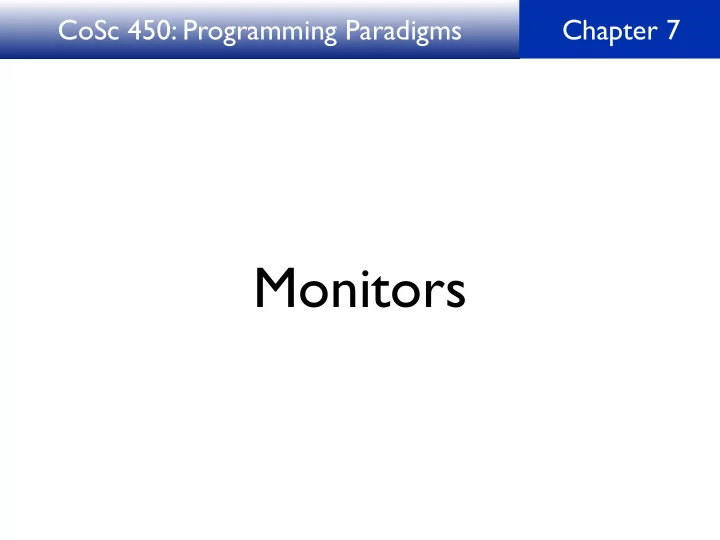

CoSc 450: Programming Paradigms Chapter 7 Monitors
CoSc 450: Programming Paradigms 07 Monitor Purpose: To consolidate the wait and signal operations in a single class. Instead of having semaphores and critical sections spread throughout the code of different processes, put the critical sections into methods of the monitor class.
CoSc 450: Programming Paradigms 07 Algorithm 7.1 n is an attribute of the monitor instead of being a global variable. Solves the critical section problem. Monitor methods are guaranteed to execute atomically.
Algorithm 7.1: Atomicity of monitor operations monitor CS integer n ¿ 0 operation increment integer temp temp ¿ n n ¿ temp + 1 p q CS.increment CS.increment p1: q1: M. Ben-Ari. Principles of Concurrent and Distributed Programming, Second edition c ≠ M. Ben-Ari 2006 Slide 7.1
CoSc 450: Programming Paradigms 07 Java monitors There is no special monitor type. Any class can be a monitor. The keyword synchronized makes a method atomic.
CriticalSection CoSc 450: Source Code .java package algorithm0701; import static util450.Util450.*; public class CriticalSection { private int n = 0; public synchronized void increment() throws InterruptedException { int temp; temp = n; randomDelay(40); n = temp + 1; } public synchronized int get() { return n; } }
Algorithm0701 CoSc 450: Source Code .java public class Algorithm0701 extends Thread { private int processID; private CriticalSection cs; Algorithm0701(int pID, CriticalSection criticalSection) { processID = pID; cs = criticalSection; }
Algorithm0701 CoSc 450: Source Code .java public void run() { if (processID == 1) { // Process p for (int i = 0; i < 10; i++) { try { System.out.println("p.i == " + i); cs.increment(); } catch (InterruptedException e) { } } } else if (processID == 2) { // Process q for (int i = 0; i < 10; i++) { try { System.out.println("q.i == " + i); cs.increment(); } catch (InterruptedException e) { } } } }
Algorithm0701 CoSc 450: Source Code .java public static void main(String[] args) { CriticalSection cs = new CriticalSection(); Algorithm0701 p = new Algorithm0701(1, cs); Algorithm0701 q = new Algorithm0701(2, cs); p.start(); q.start(); try { p.join(); q.join(); } catch (InterruptedException e) { } System.out.println("The value of n is " + cs.get()); } }
CoSc 450: Programming Paradigms 07 C++ monitors There is no special monitor type. You construct a monitor using a mutex and a lock_guard to make the operations atomic.
Algorithm-7-1 CoSc 450: Source Code .cpp #include <cstdlib> #include <iostream> #include <thread> #include <mutex> #include "Util450.cpp" using namespace std; class CriticalSection { private: int n = 0; mutex csMutex; mutex for mutual exclusion in monitor public: void increment() { lock_guard with mutex for RAII lock_guard<mutex> guard(csMutex); int temp; temp = n; randomDelay(40); n = temp + 1; } int get() { lock_guard<mutex> guard(csMutex); return n; } };
Algorithm-7-1 CoSc 450: Source Code .cpp CriticalSection cs; void pRun() { for (int i = 0; i < 10; i++) { cout << "p.i == " << i << endl; cs.increment(); } } void qRun() { for (int i = 0; i < 10; i++) { cout << "q.i == " << i << endl; cs.increment(); } } int main() { thread p(pRun); thread q(qRun); p.join(); q.join(); cout << "The value of n is " << cs.get() << endl; return EXIT_SUCCESS; }
CoSc 450: Programming Paradigms 07 C++ RAII design pattern RAII – Resource Acquisition Is Initialization Pronounced “R, A, double I” Resource acquisition happens during initialization. Resource deallocation happens during destruction.
CoSc 450: Programming Paradigms 07 RAII in Algorithm-7-1 increment() method lock_guard is a local variable, allocated on the run- time stack on the stack frame for increment() . It is created when the method is called, and destroyed automatically when the method terminates. When lock_guard is created it locks mutex . When lock_guard is destroyed it unlocks mutex . Therefore, mutual exclusion is guaranteed.
CoSc 450: Programming Paradigms 07 C++ RAII design pattern benefits Non-void functions would be difficult, if not impossible, to implement atomically with only mutex . RAII is exception safe. RAII simplifies resource management. Most C++ libraries follow the RAII design pattern.
Executing a Monitor Operation fff HH H monitor CS f n 0 M. Ben-Ari. Principles of Concurrent and Distributed Programming, Second edition c ≠ M. Ben-Ari 2006 Slide 7.2
CoSc 450: Programming Paradigms 07 Condition variable A special monitor variable that has a queue (FIFO) of blocked processes. A monitor can have more than one condition variable. There is a queue of blocked processes for each condition variable.
�������������� ��������� ��������������������� �������������� �� ����� ���������������������������� ���������������������������� ���������������������������� CoSc 450: Programming Paradigms 07 ���������������������������� ���������������������������� Condition variable ��������������������������������������������������������� There are three operations on condition variable cond . waitC ( cond ) ������ p �� cond ����� p . state ← ������� monitor . lock ← �������� signalC ( cond ) �� cond ����� � = / 0 �������������� cond ������������������� q q . state ← ����� empty ( cond ) ������ cond ������������� ��
�������������� ��������� ��������������������� �������������� �� ����� ���������������������������� ���������������������������� ���������������������������� CoSc 450: Programming Paradigms 07 ���������������������������� ���������������������������� Condition variable ��������������������������������������������������������� There are three operations on condition variable cond . waitC ( cond ) ������ p �� cond ����� p . state ← ������� monitor . lock ← �������� signalC ( cond ) �� cond ����� � = / 0 �������������� cond ������������������� q q . state ← ����� empty ( cond ) ������ cond ������������� ��
�������������� ��������� ��������������������� �������������� �� ����� ���������������������������� ���������������������������� ���������������������������� CoSc 450: Programming Paradigms 07 ���������������������������� ���������������������������� Condition variable ��������������������������������������������������������� There are three operations on condition variable cond . waitC ( cond ) ������ p �� cond ����� p . state ← ������� monitor . lock ← �������� signalC ( cond ) �� cond ����� � = / 0 �������������� cond ������������������� q q . state ← ����� empty ( cond ) ������ cond ������������� ��
Recommend
More recommend